
Sandra Moore Faber is an American astrophysicist known for her research on the evolution of galaxies. She is the University Professor of Astronomy and Astrophysics at the University of California, Santa Cruz, and works at the Lick Observatory. She has made discoveries linking the brightness of galaxies to the speed of stars within them and was the co-discoverer of the Faber–Jackson relation. Faber was also instrumental in designing the Keck telescopes in Hawaii.

The American Astronomical Society is an American society of professional astronomers and other interested individuals, headquartered in Washington, DC. The primary objective of the AAS is to promote the advancement of astronomy and closely related branches of science, while the secondary purpose includes enhancing astronomy education and providing a political voice for its members through lobbying and grassroots activities. Its current mission is to enhance and share humanity's scientific understanding of the universe as a diverse and inclusive astronomical community.
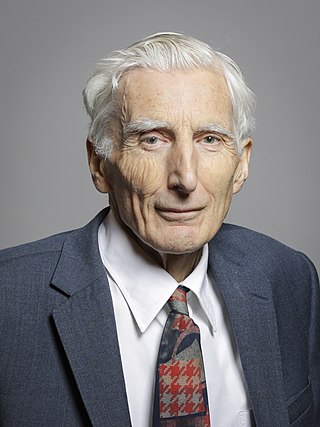
Martin John Rees, Baron Rees of Ludlow, is a British cosmologist and astrophysicist. He is the fifteenth Astronomer Royal, appointed in 1995, and was Master of Trinity College, Cambridge, from 2004 to 2012 and President of the Royal Society between 2005 and 2010.

Michel Gustave Édouard Mayor is a Swiss astrophysicist and professor emeritus at the University of Geneva's Department of Astronomy. He formally retired in 2007, but remains active as a researcher at the Observatory of Geneva. He is co-laureate of the 2019 Nobel Prize in Physics along with Jim Peebles and Didier Queloz, and the winner of the 2010 Viktor Ambartsumian International Prize and the 2015 Kyoto Prize.

Fritz Zwicky was a Swiss astronomer. He worked most of his life at the California Institute of Technology in the United States of America, where he made many important contributions in theoretical and observational astronomy. In 1933, Zwicky was the first to use the virial theorem to postulate the existence of unseen dark matter, describing it as "dunkle Materie".
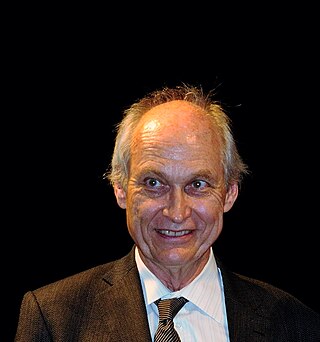
Michael S. Turner is an American theoretical cosmologist who coined the term dark energy in 1998. He is the Rauner Distinguished Service Professor Emeritus of Physics at the University of Chicago, having previously served as the Bruce V. & Diana M. Rauner Distinguished Service Professor, and as the assistant director for Mathematical and Physical Sciences for the US National Science Foundation.
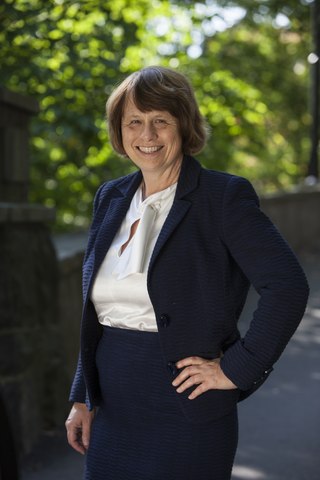
Ewine Fleur van Dishoeck is a Dutch astronomer and chemist. She is Professor of Molecular Astrophysics at Leiden Observatory, and served as the President of the International Astronomical Union (2018–2021) and a co-editor of the Annual Review of Astronomy and Astrophysics (2012–present). She is one of the pioneers of astrochemistry, and her research is aimed at determination of the structure of cosmic objects using their molecular spectra.
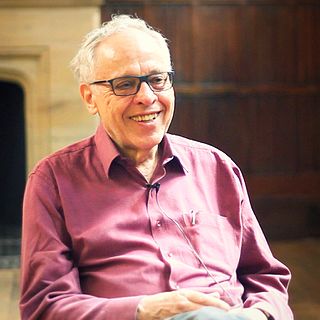
Joseph Ivor Silk FRS is a British-American astrophysicist. He was the Savilian Chair of Astronomy at the University of Oxford from 1999 to September 2011.
The Gruber Prize in Cosmology, established in 2000, is one of three prestigious international awards worth US$500,000 awarded by the Gruber Foundation, a non-profit organization based at Yale University in New Haven, Connecticut.

Roger David Blandford, FRS, FRAS is a British theoretical astrophysicist, best known for his work on black holes.

Astronomy & Astrophysics (A&A) is a monthly peer-reviewed scientific journal covering theoretical, observational, and instrumental astronomy and astrophysics. It is operated by an editorial team under the supervision of a board of directors representing 27 sponsoring countries plus a representative of the European Southern Observatory. The journal is published by EDP Sciences and the current editors-in-chief are Thierry Forveille and João Alves.

Françoise Combes is a French astrophysicist at the Paris Observatory and a professor at the Collège de France where she has been the chair of Galaxies and cosmology since 2014.
The European Astronomical Society (EAS) is a learned society, founded under the Swiss Civil Code in 1990, as an association to contribute and promote the advancement of astronomy in Europe, and to deal with astronomical matters at a European level. It is a society of individual professional astronomers, and all European astronomers can be members independently of their field of work or country of work or origin. The society offers a forum for discussion on all aspects of astronomical development in Europe, and is the organisation that represents the interests of astronomers in discussions of European-wide developments.
Marc Kamionkowski is an American theoretical physicist and currently the William R. Kenan, Jr. Professor of Physics and Astronomy at Johns Hopkins University. His research interests include particle physics, dark matter, inflation, the cosmic microwave background and gravitational waves.

Smadar Naoz is an Israeli-American astrophysicist, and was the 2015 winner of the Annie Jump Cannon Award in Astronomy for her scientific contributions to the fields of cosmology and planetary dynamics.

Nicholas Kaiser was a British cosmologist.

Hiranya Vajramani Peiris is a British astrophysicist at the University of Cambridge, where she holds the Professorship of Astrophysics (1909). She is best known for her work on the cosmic microwave background radiation, and interdisciplinary links between cosmology and high-energy physics. She was one of 27 scientists who received the Breakthrough Prize in Fundamental Physics in 2018 for their "detailed maps of the early universe."
Serena Viti is a professor at Leiden University and previously was a professor and the head of Astrophysics at University College London. In March 2019 she received an ERC Advanced Grant for her MOPPEX proposal.
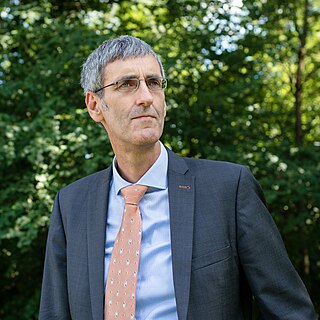
Frank Eisenhauer is a German astronomer and astrophysicist, a director of the Max Planck Institute for Extraterrestrial Physics (MPE), and a professor at Technical University of Munich. He is best known for his contributions to interferometry and spectroscopy and the study of the black hole at the centre of the Milky Way.

















